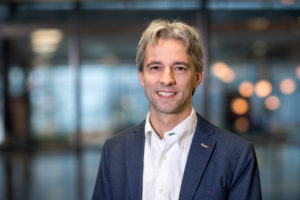To celebrate the publication of the Reaction Chemistry & Engineering 2019 Emerging Investigators special issue, the editors caught up with 2017 Emerging Investigator Professor Timothy Noël.

Timothy Noël received in 2004 his MSc degree (Industrial Chemical Engineering) from the KaHo Sint-Lieven in Ghent. He then moved to Ghent University to obtain a PhD at the Laboratory for Organic and Bioorganic Synthesis (2005-2009). Next, he moved to Massachusetts Institute of Technology (MIT) as a Fulbright Postdoctoral Fellow with Professor Stephen L. Buchwald. He currently holds a position as an associate professor and he chairs the Micro Flow Chemistry & Synthetic Methodology group at Eindhoven University of Technology. His research interests are flow chemistry, homogeneous catalysis and organic synthesis. His research on photochemistry in microfluidic reactors was awarded the DECHEMA award 2017.
Read Professor Noël’s 2017 Emerging Investigator papers A sensitivity analysis of a numbered-up photomicroreactor system and Safety assessment in development and operation of modular continuous-flow processes.
Your 2017 Emerging Investigator research paper focuses on numbering-up a photomicroreactor system. How has your research evolved from this article to your most recent work?
The numbering-up papers that we published both appeared in Reaction Chemistry & Engineering and these publications represent work that we are still proud off. The solution we developed was really easy and it comprised only components that were commercially available and inexpensive. That is a deliberate strategy in our group as we hope that this facilitates uptake of our technology in academia and industry. In this specific case, it was very encouraging to see that the technology was rapidly picked up by quite a number of colleagues to scale their chemistry.
In recent years, we focused more on the harvesting of solar energy with our luminescent solar concentrator-based photomicroreactors and we will publish in the near future some exciting updates on that work. Also we got involved into automation to develop e.g. automated platforms to carry out reaction screening or to cope with specific issues such as variable light conditions due to passing clouds.
What aspect of your work are you most excited about at the moment?
We started about three years ago with electrochemistry in flow and this is something that we will work on more in the near future. We have some upcoming work that we are very excited about and I believe that electrochemistry can become as important as photochemistry. It is my firm belief that also electrochemistry requires a technological impetus to make it scalable and widely applicable.
What do you find most challenging about your research?
I think one challenging aspect of our research is the interdisciplinarity as we combine organic chemistry and homogeneous catalysis with chemical engineering and flow chemistry. If you want to excel in all these fields, it is quite a challenge to keep track of everything and make sure we have the right people in the group that can take on this challenge. Actually, I am super-proud of my team, they really embrace these challenges and they surprise me every day with their creative solutions.
In which upcoming conferences or events may our readers meet you?
I will attend the yearly flow chemistry conference in Cambridge, organized by the Flow Chemistry Society, which is a must-go-to meeting if you work on Flow Chemistry. I am also going to the ACS meeting in Orlando, where I intend to speak during both flow and non-flow sessions. I am also attending the Beilstein meeting on Electrochemistry and the Lab on a Chip meeting in Amsterdam. Besides that, I also give quite a few seminars at academic institutions and in companies. Discussing our work with colleagues in the field is one of the things I really love about my job.
How do you spend your spare time?
I have three kids so I spend quite some time with my family. If I have some “Me-time”, I really love to do sports as my job is most of the time quite static. In addition, I also want to learn something about things that I am not an expert in, so I read lots of books and listen to podcasts which deal with history, politics, philosophy, psychology, etc.
Which profession would you choose if you were not a scientist?
A psychologist, I really love to listen and talk to people. Also in my daily job, I really want to know the person behind the researcher.
Can you share one piece of career-related advice or wisdom with other early career scientists?
Do something that you are passionate about and try to be different in your approach. Science nowadays is getting increasingly more competitive and the struggle for financial funding is extremely fierce. If you do not truly love what you are doing, you will rapidly lose interest and confidence and eventually you will probably give up. Therefore, it is important to use a different approach that sets you and your team apart. This allows you to really investigate thoroughly what you are doing without being scared of getting scooped. But it is important to never give up and to keep working hard every single day, even if grants get rejected and the results are not as great as you hoped for. Sooner or later you will find something really cool and you will realize it was all worth it.










